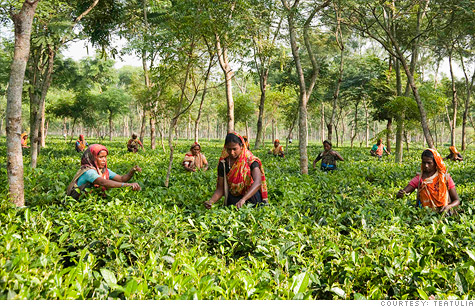
Women pick tea leaves in this Bangladesh garden where Teatulia buys its tea.
NEW YORK (CNNMoney) -- For some businesses, giving back means making a tax-deductible donation to a local little league team. But for Teatulia, an organic tea company, giving back means creating a better life for a community halfway around the globe.
The two-year-old startup has done what many companies cannot or will not, which is marry a revenue-growing business with a thriving social responsibility program.
The Denver company sells organic tea that is now sold in Whole Foods and Harrods. And its business relationship with a tea garden in Bangladesh is helping to lift a village out of poverty by providing employment, as well as educational and wealth-building programs.
The company's high quality product and do-good-in-the-world story is fueling its success.
"If we were bringing out Joe Tea, it would be very hard," said Linda Appel Lipsius, co-founder and CEO of the company. "If you don't have a story and if you don't have an interesting angle, what's the point?"
Teatulia was founded by Lipsius and friend Kazi Anis Ahmed, who is from Bangladesh and owns several businesses in the country with his family.
One of the businesses was a tea garden in the Tetulia region in Northern Bangladesh. Lipsius did some research on tea and thought that it would sell well in the United States.
She and Ahmed set up Teatulia, which would buy its tea from Ahmed's garden. A big selling point would be that the tea is grown without pesticides.
It turned out that Lipsius was on the right track. The demand for regular and specialty tea -- or tea of a very high quality or coming from a well known tea-growing region -- was building in the United States, despite the recession.
Teatulia's tea sales took off, even though it is more expensive than conventional tea. Teatulia's container of 16 tea bags retails for $9, while a regular box of 100 tea bags goes for just $3.
Part of the appeal of specialty tea is that it "is an affordable luxury," said Joe Simrany, president of the Tea Association, a national industry organization. "Unlike fine wines, most people could afford a serving of specialty tea.''
The affordable luxury hit the shelves of the Rocky Mountain Whole Foods grocery store in April 2009. Now Teatulia is in 115 Whole Foods. Lipsius expects the company to turn a profit next year.
"We are blowing up,'' said Chris Olsen, Teatulia's marketing director. ''People are extremely passionate about what we are doing.''
The company's rising revenues is only part of its success.
Teatulia's partnership with the tea farm helps employ 1,200 tea pluckers, mostly women, who live in a poverty-stricken region and have little access to education.
The Ahmed family helps with its Kazi Shahid Foundation and a cooperative, which offer programs that improve the quality of life for the tea garden employees and the surrounding community.
The foundation's programs provide a range of services from teaching literacy to building latrines. The foundation cooperative's cattle-lending program is one of its most innovative. Members borrow money to buy cows. And instead of repaying the loan in money, they pay it off in milk and cow dung. The dung is used to fertilize the organic farm.
Most participants are able to pay off their cows within two to three years. Some have amassed enough money to purchase land for their families because of the program.
Still, the effort to be socially responsible isn't always a financial slam dunk for a business.
American Apparel is an example of that, said David J. Vogel, a professor in the Haas School of Business at the University of California at Berkeley.
One of the company's claims to fame is that -- unlike other U.S. retailers -- it kept its manufacturing operations in the United States. Now it is in financial trouble.
Meanwhile, other companies with strong social responsibility programs get purchased by larger ones. That's what happened with organic tea company Honest Tea, which was recently acquired by Coca-Cola (KO, Fortune 500).
When a consumer shops for a book or a new flat-screen television, he or she is more likely to shop with convenience in mind, explained Vogel. ''People don't go into the marketplace to make the world a better place," he added. "There are exceptions, but they are exceptional."
Teatulia may turn out to be one of the exceptions. "Our story is resonating with people," said Olsen, Teatulia's marketing director.